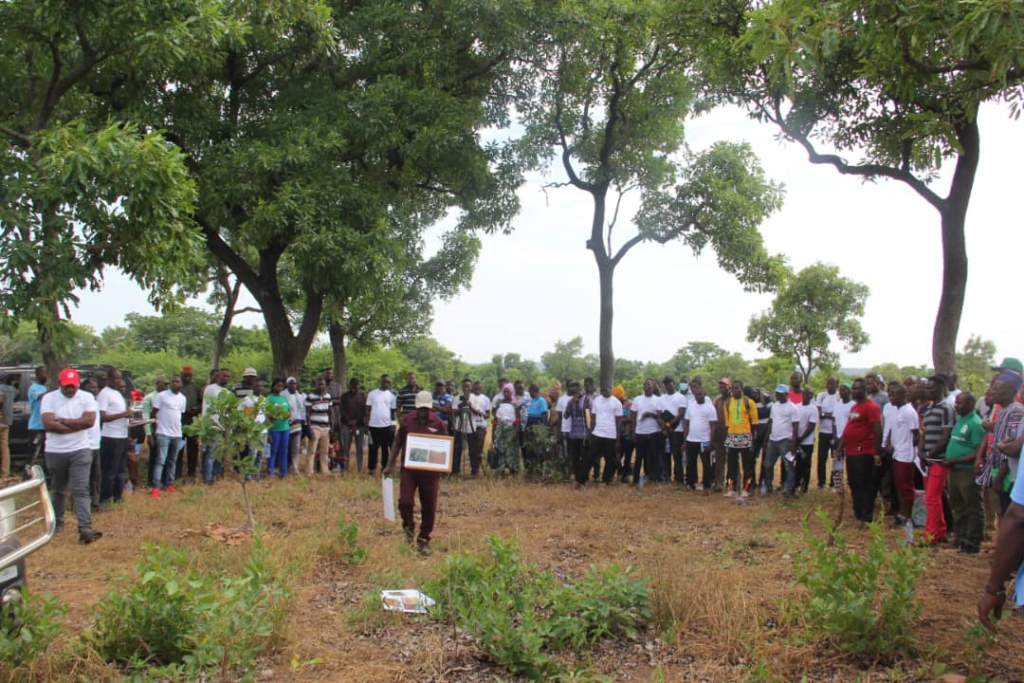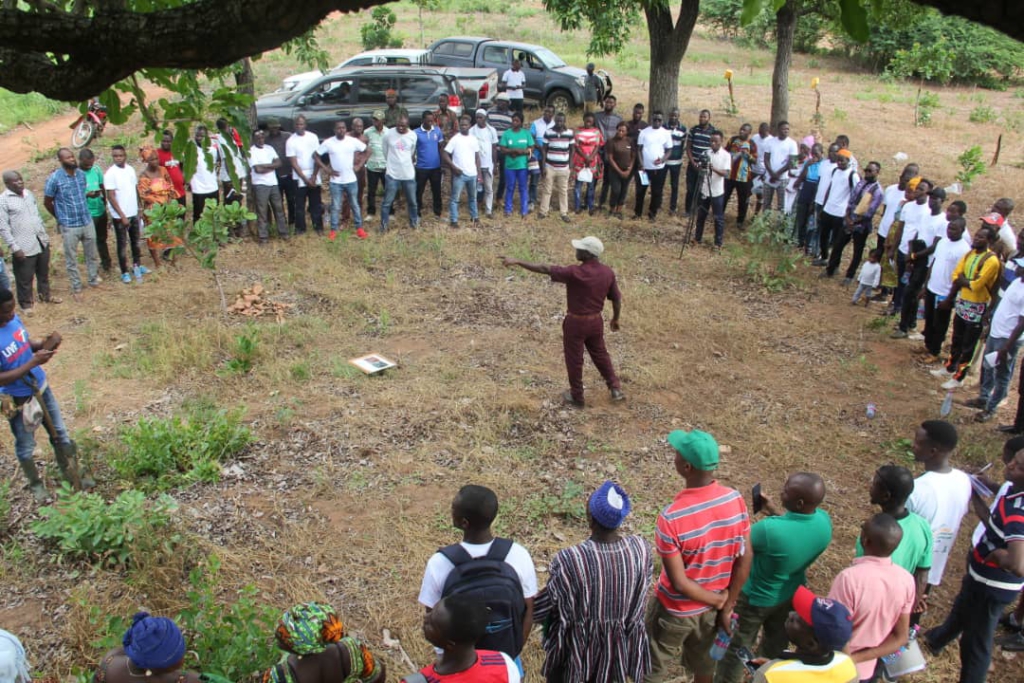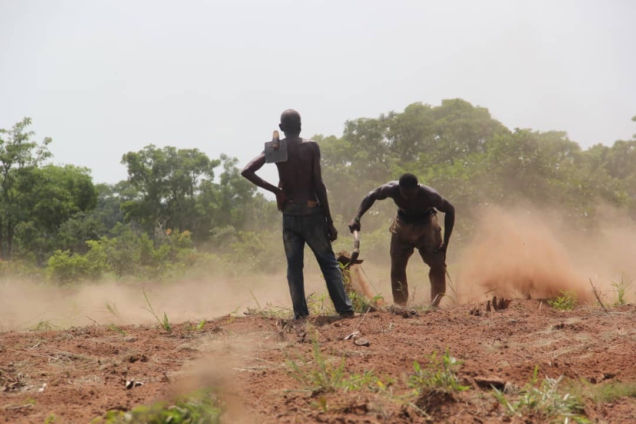Farmers in northern Ghana are concerned that lack of rains may result in a catastrophic food crisis.
Farmers plough their farmlands as the cropping season begins, but the rains aren't arriving.
Agricultural Extension agents in Bawku West, Zabzugu, Garu, Jirapa, Saboba, North East Gonja, Sawla Tuna Kalba, Kassena Nankana, and Tempane, among others, are devastated by the situation because they have been waiting far too long for the rains to set in.
Areas affected include Bawku West, Zabzugu, Garu, Jirapa, Saboba, North East Gonja, Sawla Tuna Kalba, Kassena Nankana, and Tempane, among others.
They are concerned that the scenario will have an impact on food production this year.
In East Gonja, aside from having to deal with the prolonged periods of drought, farmers are also finding it challenging to embrace climate-smart agricultural methods.

An Agriculture Extension Agent, Anass George believes the situation makes changing the narrative tough.
The story in East Mamprusi is not particularly different. The rains came earlier than predicted, and farmers were able to plant their crops before it unexpectedly halted. The farmers have since been waiting for some more rains as they watch their young cereal crops wither on their farms.
"For zones where the rains stopped abruptly, the farmers have been hoping to replant when the rains resumed. Unfortunately, the farmers may have to wait longer, as it is not clear when to expect the rains; Musah Safiatu, an Agric extension Extension worker," had indicated.
"It's impossible to predict when it will rain and when it will cease. The peak of the rainy season is impossible to predict," Jirapa Municipal's AEA, Adams Alhassan Waahu, bemoaned the situation.
Water bodies on which some small smallholder farmers rely have dried up, exacerbating the problem.
"When the plants were in bloom, the rains came down in torrents, causing the three-month-old sorghum to fall," says Georgina Sabari, AEA, Kassena Nankana West District.
Madam Sabari states that the rains do not come when they are expected, but rather during the harvesting season.
Madam Sabari and a farmer from the same district, Faustina Banakwoyem, provide a bleak picture of dealing with post-harvest losses during that time.
The weather patterns in Ghana are shifting. Because rain-fed agriculture accounts for a large portion of the country's agriculture, changes in rainfall patterns have a significant influence.
It is becoming less and less predictable when the rains will start and when they will stop, leaving farmers always racing against time all season long, guess-working when they can plant or harvest their crops on time.

The northern part of the country experiences only one rainy season, which lasts from May to September but even this pattern is no longer guaranteed as rain delays and early cessation have become the norm in recent years.
"This is exactly what we're experiencing right now. Rain does not arrive on schedule, yet it ends so sooner than expected. As a result, huge crop failures occur," Konlan Justice, Management Information System officer at Tempane district.
Other districts, such as Nanton, Tolon, Yendi, Kumbungu, Karaga, Mion, Mamprugu Moagduri, Saboba, Tatale-Sanguli, and Builsa South and North, are in the same boat.
In Namumba South, Bongo, Nandom, Sisala West and East districts farmers are praying for rain, but it does not look like there is any hope on the horizon at the moment.
The agony is felt by hundreds of farmers who feed thousands of families because the land is dry, dusty, and barren. This is a troubling trend given that it is the peak growing season.
The causes of this issue are numerous and do not appear to be going away anytime soon.
Climate change has been a major source of worry.
Africa, according to the United Nations, is the continent most vulnerable to the impact of climate change, despite the fact that it accounts for only 4% of global carbon emissions.
Raising public awareness of the suffering of the farmers in these districts would draw attention and aid, but the most vulnerable may not be able to wait much longer as the situation worsens. That is why GASIP's intervention in the timeframe is commendable.
More than 90 farmers, agriculture extension agents and media practitioners from 36 districts across the five regions of northern Ghana have been speaking about the erratic rainfall patterns in their communities in recent times at the Ghana Agricultural Sector Investment Programme's (GASIP) "Building Champions in Agribusiness Value Chains for Climate Change Resilience" event in the Savannah regional capital, Damongo.
Principal Meteorologist at the Ghana Meteorological Agency (GMet), Nana Kofi Opoku said the farmers' concerns will help them examine their forecast in order to provide the best possible information to farmers.
Mr. Opoku notes that GMet would continue to provide farmers with decadal and monthly forecasts to assist them in planning ahead of the season.
He does agree, however, that farmers may not be able to grasp the weather forecast due to the jargon employed, but believes that the usage of the media will benefit farmers greatly.
The technology and management methods developed by GASIP have also arrived at the opportune time. These technologies have been shown to help farmers maintain and increase their output.
In collaboration with the Centre for No Till Agriculture, GASIP has trained these farmers on appropriate land preparation with no or minimum tillage, no burning, use of climate-resilient seeds, appropriate nutrient/fertilizer management, and appropriate planting methods – right spacing, row planting.
Others include appropriate and timely weed & pest control, timely harvesting of produce and good storage practices, diversified crop-rotation, intercropping, and cover-cropping, permanent soil cover with crop residues
The rest include live fencing, fire belt, operation of group charter and no bush burning around the community.
The farmers, Agric Extension Agents and media were practically trained to better understand these technologies and implement them at various districts.
National Programme Coordinator for GASIP, Klutse Kumodor emphasized the need to implement these rich technologies to maximum yields.
Climate Change Adaptation Manager at GASIP, Dr. Edmund Kyei Akoto-Danso says it is their wish these farmers implement the technologies and encourage their colleagues to adopt to them to mitigate the shattering effects of climate change.
GASIP is funded by the International Fund for Agricultural Development (IFAD) and is being implemented by the Ministry of Food and Agriculture.
GASIP's goal is to eliminate poverty in rural Ghana by enhancing agribusinesses' and smallholder farmers' profitability and climate change resistance.
The implementation status of GASIP in the first four years (between 2015 and 2019) was barely 12 percent, causing IFAD to stop the program prematurely due to non-performance.
Mr. Kudomor says, in less than a year after the current management took control in 2019, the performance increased from 12% to 76 percent by February 2020.
As a result, the IFAD reclassified GASIP's implementation status from "non-performing" to "performing."
Latest Stories
-
GRA set to introduce modified taxation programme
15 minutes -
Israeli Ambassador writes: Why Iran’s nuclear ambition could no longer be Ignored
33 minutes -
Ecobank–JoyNews Habitat Fair Day 2: A visual tour of Ghana’s premier home‑ownership event
36 minutes -
“I’m so angry at myself” – Nicolas Jackson apologises after red card in Chelsea’s defeat to Flamengo
49 minutes -
Israel-Iran Conflict: Geopolitical implications and what it means for Ghana
53 minutes -
Ghana Boundary Commission assesses border security amid concerns over unapproved routes
57 minutes -
Accra: Queenmother killed at naming ceremony in Gbawe
1 hour -
Security agencies donate GH¢1m to MahamaCares
1 hour -
NPP urged to prioritise reforms over early primaries – CDD Fellow cautions
1 hour -
Electric Cars: DriveEVGH showcases next‑gen EVs at Ecobank-JOYNEWS Habitat Fair at Achimota Mall
2 hours -
NPP Race: The party needs deep reflection on the path it intends to pursue – Prof. Bokpin
2 hours -
NPP Race: No counter motion on early primaries at NEC meeting – Haruna Mohammed
2 hours -
Day 2 of the Ecobank-JOYNEWS Habitat Fair at Achimota Mall has the BEST DEALS to get you home!
2 hours -
Cargill provide Agro-Processing Equipment to Women in Cocoa-growing Communities
2 hours -
Cabinet approves Mahama Cares Bill
2 hours

